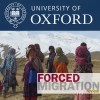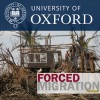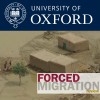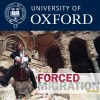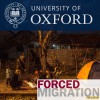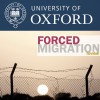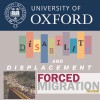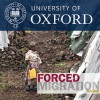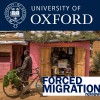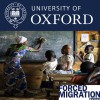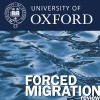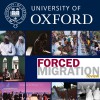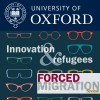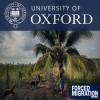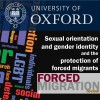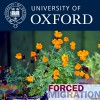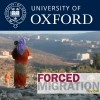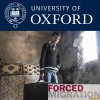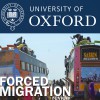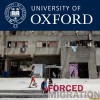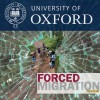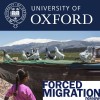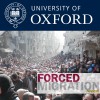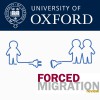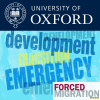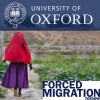|
700 |
|
FMR 56 - Unaccompanied children crossing the Darién Gap |
While there is much attention paid to the treacherous journeys of refugees and migrants crossing the Mediterranean Sea, both the media and international aid community have overlooked one of the deadliest migratory routes in the world: the Darién Gap. |
Margaret Hunter |
31 Oct 2017 |
|
699 |
|
FMR 56 - Youth outreach centres in El Salvador: providing alternatives to displacement |
A growing number of youth are fleeing El Salvador, one of the most violent countries in the world, and travelling unaccompanied to the US-Mexico border. |
Benjamin J Roth |
31 Oct 2017 |
|
698 |
|
FMR 56 - Accompaniment by the Catholic Church |
The Catholic Church is developing various initiatives to assist those fleeing violence in the Northern Triangle of Central America. |
Ashley Feasley, Todd Scribner |
31 Oct 2017 |
|
697 |
|
FMR 56 - Colombia: durable solutions for the forcibly displaced |
Colombia has a sophisticated body of law and a wealth of experience in the development of policies for the forcibly displaced. However, numerous obstacles stand in the way of attaining permanent solutions to displacement. |
Amaya Valcárcel, Vera Samudio |
31 Oct 2017 |
|
696 |
|
FMR 56 - Colombia: time to invoke the cessation clause? |
After more than five decades of internal armed conflict, in November 2016 the Colombian government signed a peace agreement with the FARC-EP. Does this mean that those Colombians who had been forced to leave the country must now begin to return? |
Beatriz Eugenia Sánchez Mojica |
31 Oct 2017 |
|
695 |
|
FMR 56 - Colombia’s ex–combatant children and adolescents |
Large numbers of children and adolescents recruited into the armed conflict in Colombia are now being demobilised. |
Stephany Armas Contreras |
31 Oct 2017 |
|
694 |
|
FMR 56 - New drivers of displacement in Colombia |
Violence and displacement have not ended with the signing of the peace agreement in Colombia. |
Alfredo Campos García |
31 Oct 2017 |
|
693 |
|
FMR 56 - Land restitution in Colombia: why so few applications? |
Halfway through Colombia’s official land restitution process, questions arise as to why the number of claims is so much lower than anticipated. |
Frances Thomson |
31 Oct 2017 |
|
692 |
|
FMR 56 - Colombia’s displaced indigenous women |
Indigenous peoples are one of the most vulnerable groups within Colombia’s internally displaced population, and a lack of understanding of their culture and needs constitutes a major challenge to their protection and assistance. |
Gina Escobar Cuero |
31 Oct 2017 |
|
691 |
|
FMR 56 - Triggers of internal displacement in Guatemala |
More than 20 years since the end of the civil war, Guatemala is once again experiencing an upsurge in internal displacement. The causes are multiple, and demand attention. |
Sindy Hernández Bonilla |
31 Oct 2017 |
|
690 |
|
FMR 56 - Falling short of protection: Peru’s new migration scheme for Venezuelans |
audio/mpeg iconparent.mp3 Peru’s introduction of a new work and study permit for Venezuelans fleeing violence in their country is to be applauded – but it provides only a limited, temporary form of protection. |
Nicolas Parent |
31 Oct 2017 |
|
689 |
|
FMR 56 - Protection in the absence of legislation in Trinidad and Tobago |
The Caribbean’s many small island States are grappling with increasingly complex mixed migration flows, yet few have introduced refugee legislation. Trinidad and Tobago is in the process of doing so. |
Rochelle Nakhid, Andrew Welch |
31 Oct 2017 |
|
688 |
|
FMR 56 - Eradicating statelessness in the Americas |
Considerable progress has been made towards eradicating statelessness in Latin America and the Caribbean since 2014 but there is still work to be done if it is to become the first world region to eradicate statelessness. |
Juan Ignacio Mondelli |
31 Oct 2017 |
|
687 |
|
FMR 56 - Extra-regional refugee resettlement in South America: the Palestinian experience |
The Humanitarian Resettlement Programme for extra-regional refugees built on the Solidarity Resettlement Programme that emerged from the 2004 Mexico Declaration and Plan of Action. |
Marcia Vera Espinoza |
31 Oct 2017 |
|
686 |
|
FMR 56 - Venezuelan displacement: a challenge to Brazil |
Brazil must strengthen its reception and integration of fleeing Venezuelans. |
Helisane Mahlke, Lilian Yamamoto |
31 Oct 2017 |
|
685 |
|
FMR 56 - The future of the Brazilian resettlement programme |
Brazil’s resettlement programmes have been praised for demonstrating the country’s commitment to refugee protection but the number resettled remains small compared with international need. |
Thais Silva Menezes, Stylianos Kostas |
31 Oct 2017 |
|
684 |
|
FMR 56 - Visas and qualifications: Syrian refugees in Brazil |
Brazil’s humanitarian visa programme for Syrian refugees and its efforts to recognise their qualifications could offer lessons for refugee protection and integration across the region. |
Gilberto M A Rodrigues, José Blanes Sala, Débora Corrêa de Siqueira |
30 Oct 2017 |
|
683 |
|
FMR 56 - Syrian refugees in Uruguay: an uncomfortable topic |
Only a year after Uruguay’s resettlement plan for Syrian refugees was established, the resettled families said they wanted to leave. Expectations have not been met. |
Raquel Rodríguez Camejo |
30 Oct 2017 |
|
682 |
|
FMR 56 - Measuring local integration in Ecuador |
In 2014-15 UNHCR Ecuador developed an index to measure the degree to which refugees are integrated in their host country, using three main dimensions of local integration: legal, economic and socio-cultural. |
Santiago Cordova, Peter Janssen |
30 Oct 2017 |
|
681 |
|
FMR 56 - The RCM Guide: a novel protection tool for cross-border disaster-induced displacement in the Americas |
A new regional guide presents practices and measures to help address the protection needs of cross-border disaster-displaced persons. |
Walter Kälin, David Cantor |
30 Oct 2017 |
|
680 |
|
FMR 56 - Disaster-induced displacement in the Caribbean and the Pacific |
People in Small Island Developing States are particularly vulnerable to displacement by disaster. Governments in the Caribbean and the Pacific need urgently to do more risk management and planning. |
Mo Hamza, Ida Koch, Malte Plewa |
30 Oct 2017 |
|
679 |
|
FMR 56 - Towards a regional agreement on environmental displacement? |
The effects of climate change influence the frequency and intensity of disasters and slow-onset environmental degradation processes, exacerbating pre-existing risks and vulnerabilities. |
Erika Pires Ramos, Fernanda de Salles Cavedon-Capdeville, Lilian Yamamoto, Diogo Andreola Serraglio |
30 Oct 2017 |
|
678 |
|
FMR 56 - Could Latin American citizenship be a fourth durable solution? |
Proposals for a regional South American citizenship put forward by the Union of South American Nations (UNASUR) offer the possibility of alternative solutions for the protection of internally displaced persons and refugees in the region. |
Valeria Llamas |
30 Oct 2017 |
|
677 |
|
FMR 56 General - Turning the Comprehensive Refugee Response Framework into reality |
As they work towards the adoption of a Global Compact on Refugees, States are implementing the Comprehensive Refugee Response Framework. |
Manisha Thomas |
30 Oct 2017 |
|
676 |
|
FMR 56 General - Towards a development approach to displacement |
o better respond to displacement, we need to adopt a medium- to long-term perspective rooted in development as well as humanitarian principles. |
Xavier Devictor |
30 Oct 2017 |
|
675 |
|
FMR 56 General - ASEAN's role in the Rohingya refugee crisis |
The Rohingya refugee crisis has become a regional crisis. Members of the Association of Southeast Asian States (ASEAN) must enhance regional cooperation in order to improve protection for the region’s refugees. |
Richa Shivakoti |
30 Oct 2017 |
|
674 |
|
FMR 56 General - Refugees in towns: experiences of integration |
In countries of first asylum, transit and destination it is increasingly towns and cities that are absorbing refugees. |
Karen Jacobsen |
30 Oct 2017 |
|
673 |
|
FMR 56 General - Canada’s Guideline 9: improving SOGIE claims assessment? |
Asylum seekers making claims relating to their sexual orientation and gender identity often face unfair refusal. |
Moira Dustin, Nuno Ferreira |
25 Oct 2017 |
|
672 |
|
FMR 55 - From the Editors |
All displaced people need some form of shelter, and circumstances dictate that in reality not much of it conforms to the typical picture of a tent or tarpaulin nor meets official standards. |
Marion Couldrey, Maurice Herson |
13 Jul 2017 |
|
671 |
|
FMR 55 - Refugee settlements and sustainable planning |
We need to develop refugee settlement planning processes that not only facilitate long-term planning but also allow for incremental upgrading. The case of M’Bera in Mauritania illustrates this. |
Brett Moore |
13 Jul 2017 |
|
670 |
|
FMR 55 - Shelter in flux |
Current humanitarian guidelines do not sufficiently cover what shelter means in volatile and protracted conflict settings, particularly outside organised camps. We propose improved tools that will address that gap. |
Charles Parrack, Brigitte Piquard, Cathrine Brun |
13 Jul 2017 |
|
669 |
|
FMR 55 - An architectural investigation into the provision of refugee accommodation |
When challenged to investigate accommodation options for refugees in their city, architecture students found that there are simple and plausible architectural answers for the integration of refugees in medium-sized European cities such as A Coruña. |
Plácido Lizancos, Evaristo Zas |
13 Jul 2017 |
|
668 |
|
FMR 55 - The case for self-recovery |
Most families recovering from the catastrophe of a disaster rebuild their own homes. This practice of self-recovery by non-displaced communities has potential for displaced populations too. |
Bill Flinn, Holly Schofield, Luisa Miranda Morel |
13 Jul 2017 |
|
667 |
|
FMR 55 - Pre-fabricated or freely fabricated? |
The architectural forms of emergency shelters and the ways they are created play a significant role in the ability of their inhabitants to deal with their displacement and to perhaps feel, even temporarily, at home. |
Irit Katz |
13 Jul 2017 |
|
666 |
|
FMR 55 - Shelter for refugees arriving in Greece, 2015-17 |
Mass arrivals in Greece since 2015 have far exceeded the supply of acceptable shelter. The attempts to provide solutions continues. |
John F Wain |
13 Jul 2017 |
|
665 |
|
FMR 55 - From drawing-board to Jungle |
Our research and development department has been working on a shelter solution in accordance with the requirement of improving logistics, installation, flexibility, the use of natural resources and, above all, the improvement of living conditions. |
Pedro Sáez, Carmen García |
13 Jul 2017 |
|
664 |
|
FMR 55 - The diversity of data needed to drive design |
The developers of the Refugee Housing Unit know every aspect and component of their design but can never know what it is like to wake up in one of them every day. |
Märta Terne, Johan Karlsson, Christian Gustafsson |
13 Jul 2017 |
|
663 |
|
FMR 55 - Choice in shelter solutions in Somalia |
The complex, inter-linked and multi-dimensional humanitarian challenges in Somalia require equally complex responses in order to be able to bolster the resilience of Somali people. |
Martijn Goddeeris, Gregg McDonald |
13 Jul 2017 |
|
662 |
|
FMR 55 - Refugees and the city: UN-Habitat's New Urban Agenda |
Special protection for refugees and displaced persons should be part of countries' housing policies. |
Raffael Beier, Jasmin Fritzsche |
13 Jul 2017 |
|
661 |
|
FMR 55 - Shelter provision and state sovereignty in Calais |
Government provision of shelter for Calais’ migrant population over the last twenty years has prioritised the assertion of state authority over the alleviation of human suffering. Policies in 2015-16, which involved the destruction of informal shelter and |
Michael Boyle |
13 Jul 2017 |
|
660 |
|
FMR 55 - A camp redefined as part of the city |
Was what was built at La Linière in Grand-Synthe in northern France a traditional refugee camp or a new kind of urban district? |
Cyrille Hanappe |
13 Jul 2017 |
|
659 |
|
FMR 55 - Appropriating buildings to house refugees: Berlin Tempelhof |
As European cities continue to co-opt existing buildings to use as refugee shelters, the inherent spatial characteristics of these structures present significant challenges to the authorities that select the sites and to those who must reside in them. |
Toby Parsloe |
13 Jul 2017 |
|
658 |
|
FMR 55 - Collective homemaking in transit |
The daily activities of the residents and volunteers of the City Plaza Refugee Accommodation Centre in Athens and the organisation of the space help to construct a positive notion of ‘home’. |
Alexandra Koptyaeva |
13 Jul 2017 |
|
657 |
|
FMR 55 - Perpetually temporary shelter in Trieste |
An old building that has seen displaced people in it many times over many years is being used by the latest group of arrivals, this time from outside Europe. |
Roberta Altin |
13 Jul 2017 |
|
656 |
|
FMR 55 - The impact of humanitarian shelter and settlements on child protection |
Insufficient attention has been paid to the design of shelters and settlements in protracted refugee encampments in Eastern Africa. The results invisibly obstruct young children’s development. |
Nerea Amorós Elorduy |
13 Jul 2017 |
|
655 |
|
FMR 55 - Reducing GBV risks through better shelter programme design |
Good shelter programming must include mitigation measures throughout the project cycle in order to reduce GBV risks. |
Amelia Rule, Jessica Izquierdo, Alberto Piccioli |
13 Jul 2017 |
|
654 |
|
FMR 55 - Thriving spaces: greening refugee settlements |
By incorporating urban agriculture initiatives within refugee camp settings, the concept of shelter can be expanded to include providing protection from the climate, addressing nutritional deficiencies and increasing levels of human dignity, place makin |
Carrie Perkins, Andrew Adam-Bradford, Mikey Tomkins |
13 Jul 2017 |
|
653 |
|
FMR 55 - Repurposing shelter for displaced people in Ukraine |
Buildings in Ukraine are being repurposed to provide shelter for those fleeing conflict in the country but, as the war continues, the need for more permanent solutions must be acknowledged. |
Laura A Dean |
13 Jul 2017 |
|
652 |
|
FMR 55 - Reconstructing 'home' in northern Uganda |
An understanding of shelter in situations of displacement and return must take into consideration both material and non-material dimensions. |
Alice Anderson-Gough |
13 Jul 2017 |
|
651 |
|
FMR 55 - Planning for the integration of refugee and host communities in Turkana County, Kenya |
The Kalobeyei New Settlement focuses on the creation of a spatial plan to guide settlement in both the short and the long term to the benefit of both host community and refugees. |
Yuka Terada, David Evans, Dennis Mwaniki |
13 Jul 2017 |
|
650 |
|
FMR 55 - Poor Albanians who hosted displaced Kosovars |
The experience of hosting displaced Kosovars is one that at least one Albanian village would prefer not to repeat. |
Beryl Nicholson |
13 Jul 2017 |
|
649 |
|
FMR 55 - Hosting the displaced – and being hosted |
A local family hosting a displaced family in their home is becoming a well-recognised form of shelter for families in displacement. |
Cynthia Caron |
13 Jul 2017 |
|
648 |
|
FMR 55 - Security of tenure in the urban context |
Addressing the lack of secure tenure and the risk of forced eviction is one of the defining characteristics of urban shelter response. |
Neil Brighton, Kirstie Farmer, Oyvind Nordlie |
13 Jul 2017 |
|
647 |
|
FMR 55 - The pavements and slums of Dhaka |
Almost half a million people every year seek refuge in Dhaka, compelled by a nexus of climate change, poverty and environmental degradation. Many end up on living on the pavements. |
Nellie LeBeau, Hugh Tuckfield |
11 Jul 2017 |
|
646 |
|
FMR 55 - Mass shelters: inappropriate in displacement |
Mass shelters appear to be an inappropriate shelter solution even in the acute onset of a crisis, creating problems of dignity and security and having significant health consequences. |
Alena Koscalova, Yann Lelevrier |
11 Jul 2017 |
|
645 |
|
FMR 55 - More design, less innovation |
Those working in international agencies to develop shelter solutions for displaced populations can learn much from human-centred design practices of professional architects and planners. |
Mitchell Sipus |
11 Jul 2017 |
|
644 |
|
FMR 55 - The humanitarian-architect divide |
Humanitarians and architects can fail to find a common language, characterising each other in schematic terms. |
Tom Scott-Smith |
11 Jul 2017 |
|
643 |
|
FMR 55 - Using public schools as shelter for IDPs in Yemen |
The two years of conflict in Yemen have created 3.3 million internally displaced person (IDPs), 20% of whom live in spontaneous settlements or collective centres, including public buildings. Schools top the list of the public buildings that are frequently |
Mohammed Al-Sabahi and Ghaidaa Motahar |
11 Jul 2017 |
|
642 |
|
FMR 55 General - Cash transfer programming: lessons from northern Iraq |
Cash transfers can be a powerful tool in situations of conflict and forced migration. However, the need to adopt a context- and conflict-sensitive approach is of great importance. |
Yvonne Deblon, Patrick Gutekunst |
11 Jul 2017 |
|
641 |
|
FMR 55 General - Facilitating 'reasonable hope' with refugees and asylum seekers |
The loss of hope over time has led to despair and a mental health crisis for refugees and asylum seekers on Manus Island and Nauru. |
Greg Turner |
11 Jul 2017 |
|
640 |
|
FMR 55 General - Vulnerability of refugees with communication disabilities to SGBV: evidence from Rwanda |
Refugees with communication disabilities are particularly vulnerable to sexual and gender-based violence, in part because of their limited ability to report abuse. |
Julie Marshall, Helen Barrett, Angelo Ebengo |
11 Jul 2017 |
|
639 |
|
FMR 55 General - The power of education in refugees' lives: Sri Lankan refugees in India |
In their determination to take control of an uncertain future, Sri Lankan refugees living in the camps of Tamil Nadu, India, have prioritised education. |
Antony Jeevarathnam Mayuran |
11 Jul 2017 |
|
638 |
|
FMR 55 General - Children of rape of refugee women, and statelessness, in Egypt |
The facilitation of birth registration procedures for children born from rape – particularly of refugee women – is necessary in order to prevent statelessness. |
Mohamed Farahat |
11 Jul 2017 |
|
637 |
|
FMR 55 General - Proving torture: demanding the impossible |
New research demonstrates that errors by Home Office asylum caseworkers in their handling of expert medical evidence of torture can make it almost impossible for survivors of torture seeking asylum in the UK to prove that they were tortured. |
Lucy Gregg, Jo Pettitt |
11 Jul 2017 |
|
636 |
|
FMR 55 General - Giving birth in transit through Greece |
Pregnant refugee women en route through Europe are having to give birth in extremely difficult conditions. They face appalling choices, and their babies risk being stateless. |
Raquel Esther Jorge Ricart |
11 Jul 2017 |
|
635 |
Creative Commons |
FMR 54 - From the Editors |
This issue of FMR looks at some of the modalities and challenges of resettlement in order to shed light on debates such as how - and how well – resettlement is managed. |
Marion Couldrey, Maurice Herson |
23 Mar 2017 |
|
634 |
Creative Commons |
FMR 54 - Practical considerations for effective resettlement |
There are certain essential elements of resettlement programming benefit both refugees and the states undertaking to receive them. |
William Lacy Swing |
23 Mar 2017 |
|
633 |
Creative Commons |
FMR 54 - The resettlement of Hungarian refugees in 1956 |
Around the 60th anniversary of the Hungarian uprising it is worth looking back on the efforts to resettle refugees to see that debates about how to help are timeless. |
Amanda Cellini |
23 Mar 2017 |
|
632 |
Creative Commons |
FMR 54 - The internationalisation of resettlement: lessons from Syria and Bhutan |
There is clearly political will to engage more on refugee issues through resettlement. A defining feature of this effort is its internationalisation. |
Carol Batchelor, Edwina O’Shea |
23 Mar 2017 |
|
631 |
Creative Commons |
FMR 54 - Surge and selection: power in the refugee resettlement regime |
There is an imbalance of power - and a resulting lack of agency for refugees - in the structure of the current resettlement regime. |
Annelisa Lindsay |
23 Mar 2017 |
|
630 |
Creative Commons |
FMR 54 - A successful refugee resettlement programme: the case of Nepal |
More than 100,000 Bhutanese refugees have been found homes in third countries. |
Bipin Ghimire |
23 Mar 2017 |
|
629 |
Creative Commons |
FMR 54 - Putting refugees at the centre of resettlement in the UK |
There are growing numbers of refugees in the UK who have been through a resettlement programme. New research in four UK cities highlights opportunities to incorporate the refugees' expertise into programme design. |
Michael Collyer, Rupert Brown, Linda Morrice, Linda Tip |
23 Mar 2017 |
|
628 |
Creative Commons |
FMR 54 - Resettlement and humanitarian admission programmes in Europe - what works? |
The European Migration Network has published a study on resettlement, humanitarian admission and private sponsorship programmes in the Member States of the European Union (EU) and Norway. |
Michiel Besters |
23 Mar 2017 |
|
627 |
Creative Commons |
FMR 54 - Southeast Asia and the disenchantment with resettlement |
While resettlement is nowadays considered as a solution to be resorted to only in exceptional circumstances, in Southeast Asia resettlement has always been, and remains, the most important durable solution for refugees. |
Sébastien Moretti |
23 Mar 2017 |
|
626 |
Creative Commons |
FMR 54 - Portugal's position on resettlement: a view from the periphery of the EU |
The evolution of European policy in recent years has shown how policy can be used to actively restrict the movement of people and as a mechanism for choosing what kind of refugee a particular country receives. |
Lúcio Sousa, Paulo Manuel Costa |
23 Mar 2017 |
|
625 |
Creative Commons |
FMR 54 - Pre-resettlement experiences: Iranians in Vienna |
Refugees' resettlement experiences may be shaped in the stages leading up to their arrival. |
Molly Fee |
23 Mar 2017 |
|
624 |
Creative Commons |
FMR 54 - LiechtensteinLanguages project |
In February 2016 Liechtenstein introduced the LiechtensteinLanguages project (LieLa) to help asylum seekers and refugees integrate more quickly in their new country. |
www.liela.li |
23 Mar 2017 |
|
623 |
Creative Commons |
FMR 54 - Matching refugees |
There is a lot of empirical evidence that the initial location in which refugees are resettled matters a great deal in terms of how they succeed in areas such as education and employment. |
Will Jones, Alexander Teytelboym |
23 Mar 2017 |
|
622 |
Creative Commons |
FMR 54 - The secondary migration of refugees resettled in the US |
More and more refugees are resettled in communities where they have no intention of living and then move on. |
Jeffrey Bloem, Scott Loveridge |
23 Mar 2017 |
|
621 |
Creative Commons |
FMR 54 - The importance of legal counsel |
At each stage of the resettlement process, the presence of counsel - legal advocates - can help refugees to present their complete cases efficiently and avoid unnecessary rejections. This provides benefits to decision makers as well. |
Betsy Fisher |
23 Mar 2017 |
|
620 |
Creative Commons |
FMR 54 - Who will resettle single Syrian men? |
Resettlement programmes for Syrian refugees severely restrict access to resettlement for single Syrian men, despite the conditions of vulnerability, insecurity and danger in which they live. |
Lewis Turner |
23 Mar 2017 |
|
619 |
Creative Commons |
FMR 54 - How NGOs have helped shape resettlement |
NGOs have a rich history of involvement in case identification and referral for resettlement, and have helped to increase numbers, improve processes and make resettlement more equitable, and accountable, for refugees. |
Amy Slaughter |
23 Mar 2017 |
|
618 |
Creative Commons |
FMR 54 - Expanding the role of NGOs in resettlement |
With global resettlement needs growing and more refugees living outside camps, NGOs are uniquely positioned to identify and interview vulnerable refugees and to play a larger role in refugee resettlement. |
Melonee Douglas, Rachel Levitan, Lucy W Kiama |
23 Mar 2017 |
|
617 |
Creative Commons |
FMR 54 - Resettlement as a protection tool for refugee children |
Here is a need to ensure that new and existing initiatives to resettle refugee children at risk, including unaccompanied children, are better able to serve their unique protection needs in today's global context. |
Susanna Davies, Carol Batchelor |
22 Mar 2017 |
|
616 |
Creative Commons |
FMR 54 - An unequal partnership: resettlement service providers in Australia |
The relationship between government and government-contracted refugee resettlement service providers in Australia needs to be based more on autonomy and trust. |
Niro Kandasamy |
22 Mar 2017 |
|
615 |
Creative Commons |
FMR 54 - Refugee resettlement and activism in New Zealand |
From 2013 the Doing Our Bit campaign has been calling for New Zealand to double its refugee quota from 750 places to 1,500. |
Murdoch Stephens |
22 Mar 2017 |
|
614 |
Creative Commons |
FMR 54 - Differential treatment of refugees in Ireland |
The Irish government makes considerable efforts to resettle Syrian refugees arriving through the UNHCR resettlement process but offers no support to those refugees - some of whom are also from Syria - who individually seek asylum. |
Natalya Pestova |
22 Mar 2017 |
|
613 |
Creative Commons |
FMR 54 - Towards a new framework for integration in the US |
The view of integration in US resettlement policy is currently disconnected from the views of integration held by refugees themselves. |
Catherine Tyson |
22 Mar 2017 |
|
612 |
Creative Commons |
FMR 54 - How refugee community groups support resettlement |
Refugee community groups often fill in service gaps after resettlement but remain unrecognised and not fully incorporated in formal resettlement processes. |
G Odessa Gonzalez Benson |
22 Mar 2017 |
|
611 |
Creative Commons |
FMR 54 - US refugee exclusion practices |
The issue of 'material support' provided to an organisation deemed to be involved in terrorism has been fraught with contention in US immigration law circles, most often over the issue of support provided under duress. |
Katherine Knight |
22 Mar 2017 |
|
610 |
Creative Commons |
FMR 54 - Security practices and resettlement |
A widely held misconception about the terrorist threat is particularly evident in refugee resettlement practices, where refugees are placed on a security continuum alongside transnational criminals and terrorists. |
Shoshana Fine |
22 Mar 2017 |
|
609 |
Creative Commons |
FMR 54 - The Solidarity Resettlement Programme, and alternatives, in Latin America |
For more than a decade, the countries in the Southern Cone of South America have had a regional Solidarity Resettlement Programme. |
María José Marcogliese |
22 Mar 2017 |
|
608 |
Creative Commons |
FMR 54 - Private refugee sponsorship in Canada |
For almost four decades, groups of Canadian private citizens have sponsored refugees for resettlement in addition to federal government resettlement programmes. |
Jennifer Hyndman, William Payne, Shauna Jimenez |
22 Mar 2017 |
|
607 |
Creative Commons |
FMR 54 - The story of a small Canadian congregation sponsoring a refugee family |
Steps for private refugee sponsorship in Canada are not clearly spelled out for those seeking to be sponsors. While the process is rewarding, it is also challenging and sometimes frustrating. |
Shannon Tito, Sharolyn Cochand |
22 Mar 2017 |
|
606 |
Creative Commons |
FMR 54 - Rethinking how success is measured |
Despite the Canadian Private Sponsorship of Refugees Program being praised for integrating refugees into the job market faster than government-assisted refugees, there may be limited cause for celebration. |
Chloe Marshall-Denton |
22 Mar 2017 |
|
605 |
Creative Commons |
FMR 54 - Expectations of vulnerability in Australia |
The ability of refugees to gain admission to Australia is increasingly based on perceptions of helplessness, suffering and 'deservingness'. One consequence is that men in particular are marginalised following resettlement. |
Alice M Neikirk |
22 Mar 2017 |
|
604 |
Creative Commons |
FMR 54 - Resettlement of refugee youth in Australia: experiences and outcomes over time |
Findings from a longitudinal study of long-term resettlement experiences of refugee youth living in Melbourne. |
Celia McMichael, Caitlin Nunn, Ignacio Correa-Velez, Sandra M Gifford |
22 Mar 2017 |
|
603 |
Creative Commons |
FMR 54 - Rejecting resettlement: the case of the Palestinians |
Palestinian rejection of resettlement was driven by political concerns. This case study shows the importance of engaging directly with refugees when devising durable solutions |
Anne Irfan |
22 Mar 2017 |
|
602 |
Creative Commons |
FMR 54 - The resettlement of Polish refugees after the second world war |
The passing of the Polish Resettlement Act and the creation of the different agencies related to it undoubtedly represented an unprecedented response to the challenge of mass migration in the UK. |
Agata Blaszczyk |
22 Mar 2017 |
|
601 |
Creative Commons |
FMR 54 - Iraqi refugees in Spanish-speaking Californian communities |
Cultural orientation is necessary but needs to be appropriate for the realities of the place where refugees are resettled. |
Ken Crane, Lisa Fernandez |
22 Mar 2017 |

